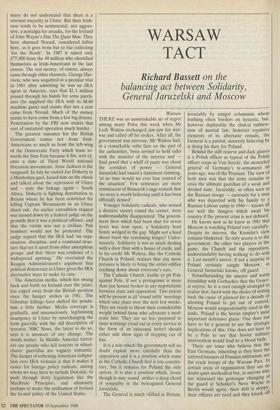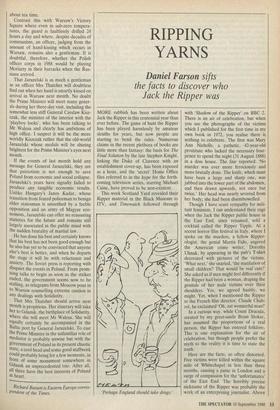WARSAW TACT
Richard Bassett on the
balancing act between Solidarity, General Jaruzelski and Moscow
Warsaw THERE was an unmistakable air of regret among many Poles this week when Mr Lech Walesa exchanged jaw-jaw for war- war and called off his strikes. After all, the government was nervous, Mr Walesa had, in a remarkable volte face on the part of the authorities, been invited to hold talks with the minister of the interior and final proof that a whiff of panic was about the corridors of power — General Jaruzelski had issued a statement claiming, 'at no time would we ever lose control of the situation'. Few sentences are more reminiscent of Bismarck's sage remark that 'no story is worth believing until it has been officially denied'.
Younger Solidarity radicals, who sensed a decisive victory round the corner, were understandably disappointed. The govern- ment door which had been shut for seven years was now open, a Solidarity boot firmly wedged in the gap. Might not a hard shove burst the remaining hinges? Unfor- tunately, Solidarity is not so much dealing with a door than with a house of cards, and to his credit Mr Walesa, like the Catholic Church in Poland, realises that any more pressure is likely to bring the entire edifice crashing down about everyone's ears.
The Catholic Church, loathe to pit Pole against Pole, if not a protagonist is more than just honest broker in any negotiations between state and opposition. Two priests will be present at all 'round table' meetings which take place over the next few weeks. They are ready to throw their considerable weight behind those who advocate a mod- erate line. They are no less prepared to issue warnings (read out at every service in the form of an episcopal letter) should either side show signs of stepping out of line.
It is a role which the government will no doubt exploit more carefully than the opposition and it is a position which some in the Catholic Church feel is too concilia- tory, but it remains for Poland the only option. It is also a position which, ironic though it may sound, strikes a deep chord of sympathy in the beleagured General Jaruzelski.
The General is much vilified in Britain,
invariably by emigre columnists whose loathing often borders on hysteria, but, however deplorable the clinical ruthless- ness of martial law, however repulsive elements of its aftertaste remain, the General is a patriot, sincerely believing he is doing his duty for Poland.
Behind the stiff reserve and dark glasses is a Polish officer as typical of the Polish officer corps as Von Seeckt, the monocled general of Germany's re-armament 60 years ago, was of the Prussian. The view of both men was that the army remains in crisis the ultimate guardian of a weak and divided state. Jaruzelski, so often seen as the Russian stooge — curiously for a man who was deported with his family to a Russian Labour camp in 1940 — knows all too well the dangers which await his country if the present crisis is not defused.
He knows now as he knew in 1981 that Moscow is watching Poland very carefully. Despite its interest, the Kremlin's view remains blinkered. Its only access is to the government, the other two players in the game, the Church and the opposition, understandably having nothing to do with it. Last month's unrest, if not a surprise in Poland certainly caught Moscow, as General Jaruzelski knows, off guard. Notwithstanding the sincere and warm friendship with Gorbachev that the Gener- al enjoys, he is a cool enough strategist to realise that, faced with the choice of setting back the cause of glasnost for a decade or allowing Poland to get out of control, Moscow would unquestionably send in the tanks. Poland is the Soviet empire's most important defensive glacis. One does not have to be a general to see the strategic implications of this. One does not have to be a Pole to see that Soviet military intervention would lead to a blood bath. There are some who believe that the East Germans, inheriting as they have the tattered banners of Prussian militarism, are the crack troops of the Warsaw Pact, In certain areas of organisation they are no doubt quite methodical but, as anyone who has witnessed the grotesque changing of the guard at Schinkel's Neve Wache in Berlin would agree, their drill is slopPY, their officers are tired and they knock of about tea time.
Contrast this with Warsaw's Victory Square where even in sub-zero tempera- tures, the guard is faultlessly drilled 24 hours a day and where, despite decades of communism, an officer, judging from the amount of hand-kissing which occurs in Warsaw, remains also a gentleman. It is doubtful, therefore, whether the Polish officer corps in 1988 would be playing Moriarty in their barracks when the Rus- sians arrived.
That Jaruzelski is as much a gentleman as an officer Mrs Thatcher will doubtless find out when her hand is smartly kissed on arrival in Warsaw next month. No doubt the Prime Minister will meet many gener- als during her three-day visit, including the somewhat less stiff General Czeslaw Kisz- czak, the minister of the interior with the 'playboy looks', who has been talking to Mr Walesa and clearly has ambitions of high office. I suspect it will be the more worldly Kiszczak rather that the old-world Jaruzelski whose medals will be shining brightest for the Prime Minister's eyes next month.
If the events of last month hold any message for General Jaruzelski, they are that patriotism is not enough to save Poland from economic and social collapse. Jaruzelski's years have signally failed to produce any tangible economic results. Unlike Hungary's Janos Kadar, whose transition from feared policeman to benign elder statesman is smoothed by a feeble Opposition and an army of Magyar eco- nomists, Jaruzelski can offer no reassuring statistics for the future and remains still largely associated in the public mind with the sudden brutality of martial law.
He has done his best and certainly knows that his best has not been good enough but he also has yet to be convinced that anyone else's best is better, and when he departs the stage it will be with reluctance and anxiety. The Soviet press is reporting with disquiet the events in Poland. From prom- ising talks to begin as soon as the strikes ended, the government seems now to be stalling, as telegrams from Moscow pour in to Warsaw counselling extreme caution in any dealings with Solidarity. That Mrs Thatcher should arrive next month is propitious. Her itinerary will take her to Gdansk, the birthplace of Solidarity, where she will meet Mr Walesa. She will equally certainly be accompanied in the Baltic port by General Jaruzelski. To cast the Prime Minister in the unfamiliar role of mediator is probably unwise but with the government of Poland in its present chaotic state, a cool head and some good staffwork could probably bring for a few moments, in front of some monument somewhere in Gdansk an unprecedented trio. After all, all three have the best interests of Poland at heart.
Richard Bassett is Eastern Europe corres- pondent of the Times.























































 Previous page
Previous page